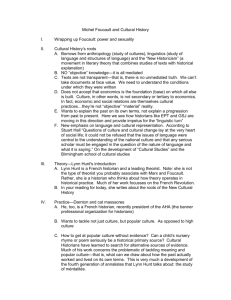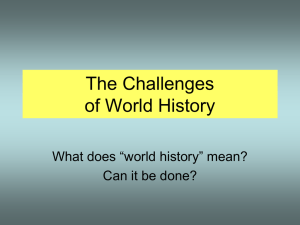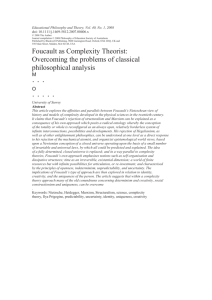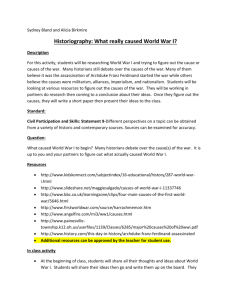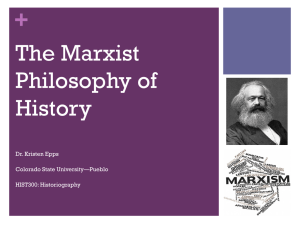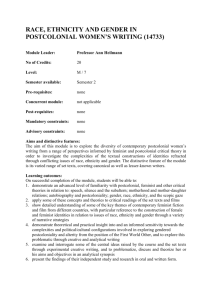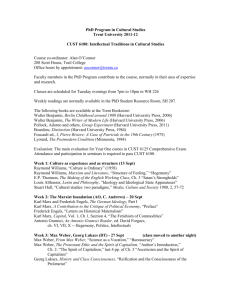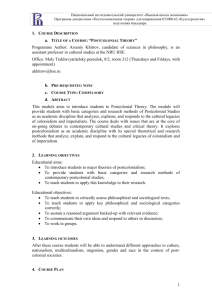Hist 404
advertisement
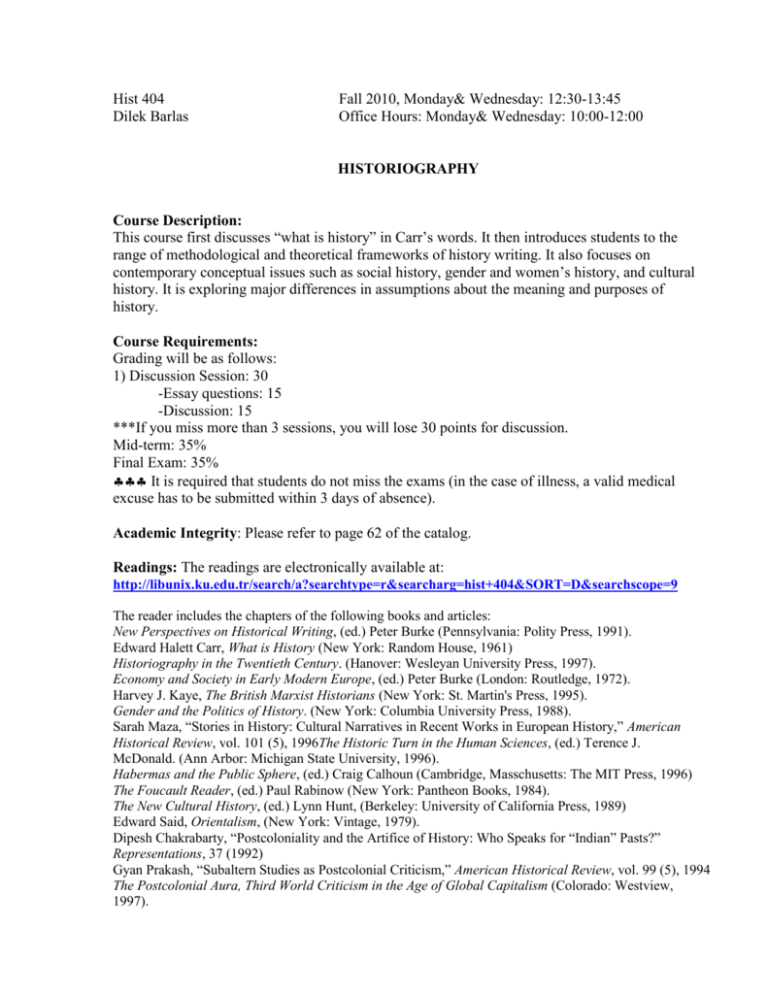
Hist 404 Dilek Barlas Fall 2010, Monday& Wednesday: 12:30-13:45 Office Hours: Monday& Wednesday: 10:00-12:00 HISTORIOGRAPHY Course Description: This course first discusses “what is history” in Carr’s words. It then introduces students to the range of methodological and theoretical frameworks of history writing. It also focuses on contemporary conceptual issues such as social history, gender and women’s history, and cultural history. It is exploring major differences in assumptions about the meaning and purposes of history. Course Requirements: Grading will be as follows: 1) Discussion Session: 30 -Essay questions: 15 -Discussion: 15 ***If you miss more than 3 sessions, you will lose 30 points for discussion. Mid-term: 35% Final Exam: 35% It is required that students do not miss the exams (in the case of illness, a valid medical excuse has to be submitted within 3 days of absence). Academic Integrity: Please refer to page 62 of the catalog. Readings: The readings are electronically available at: http://libunix.ku.edu.tr/search/a?searchtype=r&searcharg=hist+404&SORT=D&searchscope=9 The reader includes the chapters of the following books and articles: New Perspectives on Historical Writing, (ed.) Peter Burke (Pennsylvania: Polity Press, 1991). Edward Halett Carr, What is History (New York: Random House, 1961) Historiography in the Twentieth Century. (Hanover: Wesleyan University Press, 1997). Economy and Society in Early Modern Europe, (ed.) Peter Burke (London: Routledge, 1972). Harvey J. Kaye, The British Marxist Historians (New York: St. Martin's Press, 1995). Gender and the Politics of History. (New York: Columbia University Press, 1988). Sarah Maza, “Stories in History: Cultural Narratives in Recent Works in European History,” American Historical Review, vol. 101 (5), 1996The Historic Turn in the Human Sciences, (ed.) Terence J. McDonald. (Ann Arbor: Michigan State University, 1996). Habermas and the Public Sphere, (ed.) Craig Calhoun (Cambridge, Masschusetts: The MIT Press, 1996) The Foucault Reader, (ed.) Paul Rabinow (New York: Pantheon Books, 1984). The New Cultural History, (ed.) Lynn Hunt, (Berkeley: University of California Press, 1989) Edward Said, Orientalism, (New York: Vintage, 1979). Dipesh Chakrabarty, “Postcoloniality and the Artifice of History: Who Speaks for “Indian” Pasts?” Representations, 37 (1992) Gyan Prakash, “Subaltern Studies as Postcolonial Criticism,” American Historical Review, vol. 99 (5), 1994 The Postcolonial Aura, Third World Criticism in the Age of Global Capitalism (Colorado: Westview, 1997). Course Schedule Week 1 (27-29 September): Introduction Week 2 (4-6 October): Past and Future Peter Burke, “Overture: the New History, its Past and its Future, in New Perspectives on Historical Writing, pp. 1-23. Week 3 (11-13 October): Causation in History Edward Halett Carr, What is History, pp.113-143 Week 4 (18-20 October): The Annales School Georg Iggers, “France: The Annales,” in Historiography in the Twentieth Century, pp. 51-64. Fernand Braudel, “History and the Social Sciences,” in Economy and Society in Early Modern Europe, pp. 11-41. Week 5 (25-27 October): Social History and British Marxist Historical Tradition Harvey J. Kaye, The British Marxist Historians, pp.1-22; 167-220. ( Week 6 (1-3 November): Gender and Women’s History Joan Wallach Scott, “Gender: A Useful Category of Historical Analysis,” in Gender and the Politics of History, pp. 28-50. John Scott, “Women’s History,” in New Perspectives on Historical Writing, pp. 42-66. Week 7 (8-10 November): Oral History Gwyn Prins, “Oral History,” in New Perspectives on Historical Writing, pp. 114-139. Week 8: No Class – Bayram Week 9 (22-24 November): Mid-term Exam The Revival of Narrative Sarah Maza, “Stories in History: Cultural Narratives in Recent Works in European History,” American Historical Review, pp. 1493-1515. Peter Burke, “History of Events and the Revival of Narrative,” New Perspectives on Historical Writing, pp. 233-248. Week 10: (29 November-1 December) From Social History to Cultural History Geoff Eley, “Is All the World a Text? From Social History to the History of Society Two Decades Later," in The Historic Turn in the Human Sciences, pp. 193-243. Week 11 (6-8 December): The Habermas of Historians Craig Calhoun, “Introduction: Habermas and the Public Sphere,” in Habermas and the Public Sphere, pp. 1-48. Week 12 (13-15 December): The Foucault of Historians Paul Rabinow, The Foucault Reader, pp. 3-29; 206-225. Week 13 (20-22 December): The Foucault of Historians II Paul Rabinow, The Foucault Reader, pp. 239-256; 273-289. Patricia O’Brian, “Michel Foucault’s History of Culture,” in The New Cultural History, pp. 25-46. Week 14 (27-29 December): Said and Orientalism Edward Said, Orientalism, pp. 1-28. Dipesh Chakrabarty, “Postcoloniality and the Artifice of History: Who Speaks for “Indian” Pasts?” Representations, pp. 1-26. Week 15 (2-4 January): Subaltern Studies Gyan Prakash, “Subaltern Studies as Postcolonial Criticism,” American Historical Review, pp. 1475-1490. Arif Dirlik, “The Postcolonial Aura: Third World Criticism in the Age of Global Capitalism,” in The Postcolonial Aura, Third World Criticism in the Age of Global Capitalism, pp. 52-83.

